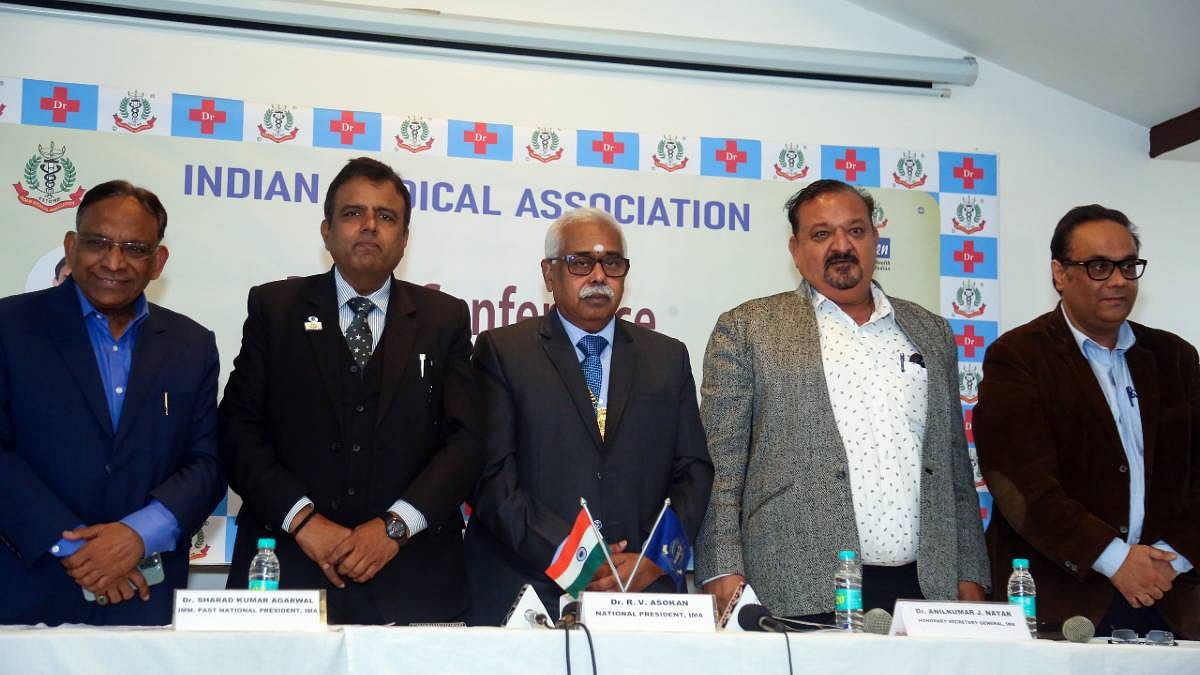New Delhi: The Indian Medical Association (IMA) has urged the central government to issue a national directive to policemen stating that cases of alleged medical negligence should be considered as actions “not intended to cause death, done by consent in good faith, for person’s (patient’s) benefit”, keeping in mind the “difficulty to define gross negligence”.
Doctors are protected from criminal proceedings in cases of death resulting from actions done in good faith for the benefit of the patient with their consent.
The IMA, the largest body of doctors in India, has argued that cases of alleged medical negligence should first be registered under Section 26 of the newly-enacted criminal code, Bharatiya Nyaya Sanhita (BNS).
Section 26 of the BNS states: “A, a surgeon, knowing that a particular operation is likely to cause the death of Z, who suffers under the painful complaint, but not intending to cause Z’s death, and intending, in good faith, Z’s benefit, performs that operation on Z, with Z’s consent. A has committed no offence.”
The IMA sent a letter on the subject to Union Home Minister Amit Shah last week, stating: “Medical professionals are constrained to take a calibrated risk many times in critical situations. Therefore, it becomes difficult to define gross negligence.”
ThePrint has a copy of the letter, which has been undersigned by IMA president Dr R.V. Asokan and secretary general Dr Anilkumar J. Nayak.
The IMA has pleaded to the government that provisions of Section 106 of the BNS — which prescribes a jail term of up to two years for doctors charged with causing death by medical negligence — “should be considered only when the officer is satisfied of the recklessness or gross negligence”.
The doctors’ body has argued that an order from the home ministry providing further clarifications on provisions under Sections 26 and 106 of the BNS should be issued for the benefit of investigating officers.
In its letter, the IMA has suggested that “whenever a complaint of criminal negligence is taken up by the investigating officer, provisions of Section 26 of BNS shall take precedence”.
But when the investigating officer is satisfied that Section 106 cannot be excluded, he may follow the procedures as enunciated by the judgment of the Supreme Court in Jacob Mathew vs State of Punjab case of 2005, the IMA has said. In this judgement, the court had acknowledged the need to protect doctors from frivolous criminal prosecutions while also emphasising accountability in cases of genuine medical negligence.
The court laid down guidelines to differentiate between genuine errors and acts of negligence by medical practitioners, while saying that for a doctor to be held criminally liable, the negligence should be of such a high degree as to amount to gross negligence.
The judgement also stressed on the significance of obtaining expert opinion to establish negligence, and said the opinion should be given by a doctor in the same field as the one being accused.
Talking to ThePrint, Asokan said that some states such as Kerala, Tamil Nadu and Punjab had adopted the practice of referring every case of medical negligence to an expert panel.
“But a national directive in this regard will ensure that this is followed across states,” Asokan said.
It was on the plea of the IMA that the government had affected an amendment in the BNS Bill, from its draft proposed earlier. Through the amendment in Section 106, a separate category of death due to medical negligence was created with a maximum punishment of up to two years or fine, or both, for the doctor responsible.
The BNS, which replaced the Indian Penal Code (IPC), has increased the term of imprisonment to up to five years for other categories of deaths caused by negligence, such as traffic accidents.
Under the IPC, all cases of death due to medical negligence were punishable by up to two years in jail.
Also Read: House panel urges Modi govt to include elements from Obamacare in its health insurance scheme PMJAY
Larger goal to get doctors exempted from ‘criminality’
ThePrint had earlier reported that the IMA had appealed to the government to treat cases of medical negligence under the “Law of Torts”, i.e. as civil rather than criminal matters.
Asokan said that it remains the larger goal of the association. “But we first wanted some breather for doctors under the existing law and therefore the latest letter,” he explained.
While criminal law aims to punish individuals who commit crimes, the “Law of Torts” aims to compensate individuals who suffer harm as a result of the wrongful actions of others.
The demand of the IMA has also garnered support from doctors outside the association.
“The fact is that if unfortunately a patient dies during the course of treatment, there is definitely not an intent of murder by the doctor and the law should take it into account,” said Dr Gurinder Grewal from the Alliance of Doctors for Ethical Healthcare, a group of doctors who advocate for ethical practices in medicine.
(Edited by Nida Fatima Siddiqui)
Also Read: ICMR wants to develop India-specific growth reference standards for kids. Why this is important

